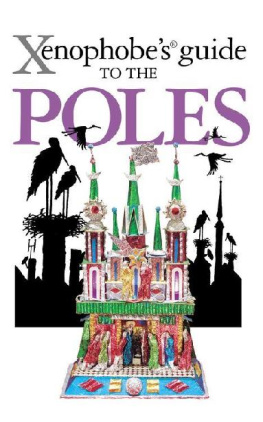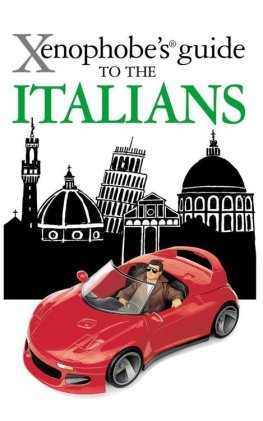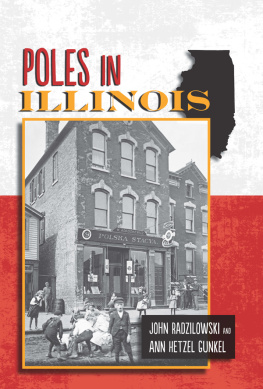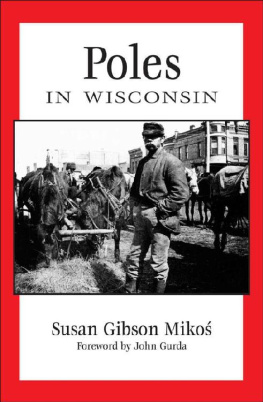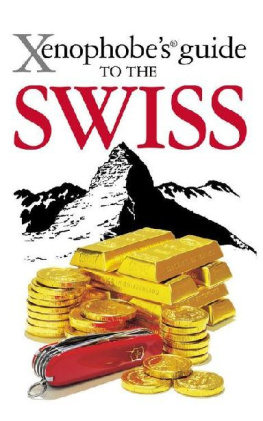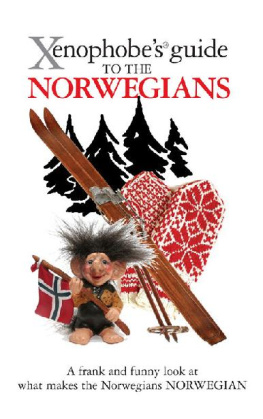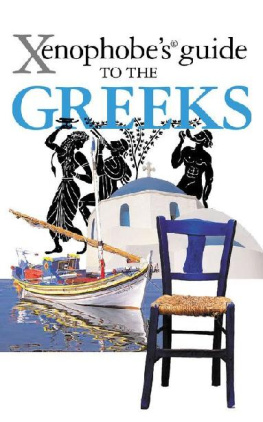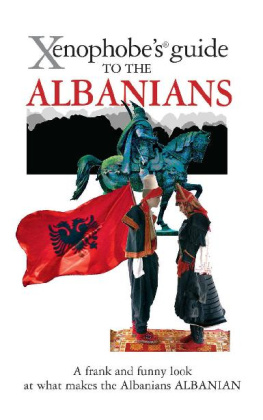Ewa Lipniacka - Xenophobe’s guide to the Poles
Here you can read online Ewa Lipniacka - Xenophobe’s guide to the Poles full text of the book (entire story) in english for free. Download pdf and epub, get meaning, cover and reviews about this ebook. City: London, Polska, year: 2012, publisher: Xenophobe’s Guides, genre: Home and family. Description of the work, (preface) as well as reviews are available. Best literature library LitArk.com created for fans of good reading and offers a wide selection of genres:
Romance novel
Science fiction
Adventure
Detective
Science
History
Home and family
Prose
Art
Politics
Computer
Non-fiction
Religion
Business
Children
Humor
Choose a favorite category and find really read worthwhile books. Enjoy immersion in the world of imagination, feel the emotions of the characters or learn something new for yourself, make an fascinating discovery.
- Book:Xenophobe’s guide to the Poles
- Author:
- Publisher:Xenophobe’s Guides
- Genre:
- Year:2012
- City:London, Polska
- Rating:3 / 5
- Favourites:Add to favourites
- Your mark:
- 60
- 1
- 2
- 3
- 4
- 5
Xenophobe’s guide to the Poles: summary, description and annotation
We offer to read an annotation, description, summary or preface (depends on what the author of the book "Xenophobe’s guide to the Poles" wrote himself). If you haven't found the necessary information about the book — write in the comments, we will try to find it.
Xenophobe’s guide to the Poles — read online for free the complete book (whole text) full work
Below is the text of the book, divided by pages. System saving the place of the last page read, allows you to conveniently read the book "Xenophobe’s guide to the Poles" online for free, without having to search again every time where you left off. Put a bookmark, and you can go to the page where you finished reading at any time.
Font size:
Interval:
Bookmark:


Geopolitics is the chief architect of the Polish character.
The Polish population is 38 million compared with 9 million Swedes, 82 million Germans, 10 million Czechs, 5 million Slovaks, 10 million Hungarians, 47 million Ukrainians, 4 million Lithuanians, 142 million Russians, 52 million English, and 307 million Americans.
Poland is 1 times the size of Spain and a bit smaller than Germany, but could fit into Russia 54 times.
Legend has it that one fine spring morning in ancient times, three Slavonic brothers, Czech, Lech, and Rus, set out to find new homes. Czech founded the Czech nation in the first good clearing they came to. The other two carried on until Lech saw an eagle building its nest, took it as a sign from the gods, and founded Gniezno, the first capital of Poland. Rus travelled on.
Most of Poland is a flat open plain described by military experts as an ideal spot for a battlefield.
Lechs choice must rank with the ten worst decisions in history. Most of Poland is a flat open plain described by military experts as an ideal spot for a battlefield (a feature exploited today by rental rather than invasion, for NATO manoeuvres, amongst others). Poland has been fought on or over at some time or another by virtually every country in Europe, including, amazing as it may seem, Sweden, and for whole centuries at a time it disappeared off the map altogether.
But the past is another country. Today Poland is vibrantly independent and planning to stay that way. Its holding its own in the EU and is as keen on playing host to American rocket bases as it previously was to Russian ones. The only invasions it anticipates , or hopes for, are from tourists, and investors.
The Poles are self-critical; they know themselves inside out, warts and all. What is more, they will compulsively pick at their blemishes.
The Poles are self-critical; they know themselves inside out, warts and all. What is more, they will compulsively pick at their blemishes. There is not a problem, be it social, political, economic, national or local, which is not regularly and minutely dissected, put together again in every order imaginable and argued over endlessly . There is no national characteristic , either real or imagined, which has not been lamented, and its consequences listed. But when it comes to transferring the words into deeds well, that is the trouble with Poles: argumentative, undisciplined, no follow-through, straw fire, as any Pole will tell you, interminably.
However, this is a game only the home team can play. They would rather not have their faults pointed out by others. Under attack, they will defend every flaw, usually beginning with the phrase, But you couldnt possibly understand, the problem is so Polish. Persist and you will offend and, with a Pole, taking offence comes only too easily, although luckily it doesnt last long. The most perfect solutions to all their problems more often than not are arrived at late at night, with alcohol fumes heating the air, but are forgotten with the hangover in the morning.
Slavonic brotherhood notwithstanding, the Poles have always considered that East is East and West is best and the twain meet on Polands eastern frontiers. If money talks, then what it tells the Poles is to travel west when seeking fame and fortune because to the east lie lands that are rich with people who are poor and who cannot afford Polish plumbers.
If money talks, then what it tells the Poles is to travel west when seeking fame and fortune.
Their Russian neighbours are seen as brutish; a people born to be dominated, neither enterprising nor hard working, their successes being put down to sheer weight of numbers and ownership of essential raw materials . Although wary of the Russian mafia, on whom they lay the blame for the rise in their own crime rate, the Poles were quick to capitalise on the opportunities that trade with Russia and its former empire offered and many a fortune was made, and lost, on the tricky Russian market. Because of this familiarity, the Poles were the first to warn of the danger of Russias stranglehold on world resources. Now, when Russians turn off the gas tap with every cold snap, the rest of Europe can more easily understand Polish fears and resentment.
The Poles find their other neighbours, the Germans, a dull lot who, left to their own devices, will stay in their own backyard and nurture Heimat, but as a nation (whether by war or trade) are born to dominate. Though some Poles still worry that Germany might try to reclaim Silesia, an ever- increasing army of Polish migrants are making their home there, and most Poles hope that EU membership of both parties will keep German militancy at bay.
The Poles have the misfortune to be sandwiched between the two giants and try to turn it to their advantage by playing business partner to either and middleman to both. But then, theyre adept at dancing on tightropes.
The Poles have the misfortune to be sandwiched between the two giants and try to turn it to their advantage Theyre adept at dancing on tightropes.
For nations to admire, Poles look further afield. Most frequently, in search of style gurus, they turn to Italy, and not for the first time in history. Bona Sforza, wife of Zygmunt the Aged, introduced the Renaissance to Poland, along with architects, artists and craftsmen, and revolutionised Polish cuisine by bringing lettuce, leeks, cabbages and cauliflowers from Italy with her. In the 18th century, Bacciarelli and Canaletto painted Warsaw, which was being remodelled by, amongst others, Italian architect Dominic Merlini. After the Second World War, Canalettos paintings were used as a guide for the reconstruction of streets and faades that the Germans had demolished.
For centuries the Poles, especially the aristocracy, slavishly followed French style from language to fashion , and lived in France if they could afford it. Poles who fought bitterly to save themselves from becoming Russians or Germans voluntarily made themselves imitation Frenchmen. Napoleon was revered, though he only saw the Poles as cannon fodder, and Polish law and many civil institutions are based on the Napoleonic code. But French xenophobia and frequent ganging up with Germany in EU forums, has brought the one-sided love affair to an end. Relations are so frosty that even the French language is rarely taught in Polish schools.
Nowadays its the English who have captured Polish hearts and minds: English pubs, English products, the English language taught in all schools.
Nowadays Polish hearts and minds belong to the English. There are English pubs and English products, signs in English over shop doors, and English taught in all schools. Football fans even try to measure up to English football hooligans, luckily without much success. Britain and Ireland were the first EU countries to open their doors to the Poles, who flock there to work, study and play. Consequently, Roman Catholicism is the fastest growing religion in Britain and European demographic statisticians are working overtime to keep up.
Poles admire the Americans for their single-minded pursuit of wealth, but see them as nie kulturalni (uncultured) a signal condemnation in Polish eyes. American Polish jokes have little currency in Poland. However, Poles laugh at Polish Americans and see them as a nave lot, but put this down to the effect of living in America.
Font size:
Interval:
Bookmark:
Similar books «Xenophobe’s guide to the Poles»
Look at similar books to Xenophobe’s guide to the Poles. We have selected literature similar in name and meaning in the hope of providing readers with more options to find new, interesting, not yet read works.
Discussion, reviews of the book Xenophobe’s guide to the Poles and just readers' own opinions. Leave your comments, write what you think about the work, its meaning or the main characters. Specify what exactly you liked and what you didn't like, and why you think so.

